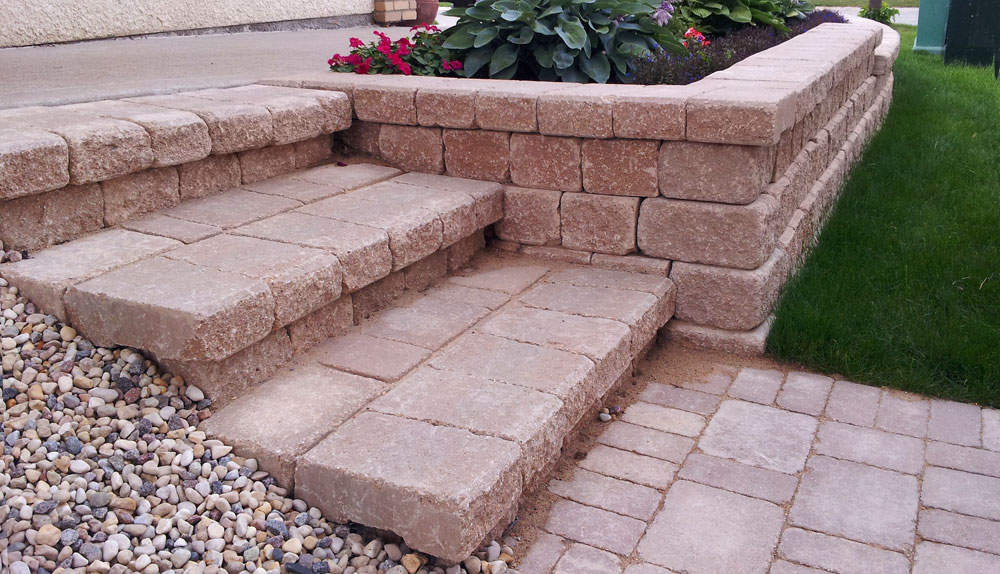Stonework Restoration and Patio Repair

Although pavers are generally one of the lowest maintenance options for your yard, they do sometimes fall into disrepair. If your driveway or patio is made from concrete pavers, you are in luck – they are one of the easiest construction materials to fix
Pavers are uniformly sized and shaped bricks. This means a small area of a patio or driveway can be removed and re-installed in a seamless repair. If individual bricks are stained or damaged to the point that they need to be replaced, no problem, just replace them with new bricks. Try that with a poured concrete patio, walkway or driveway!
Let's say your poured concrete driveway has sunk and it's all cracked up. You can hire someone to pump grout under your driveway to level it with your garage slab, but then you are left with dozens of holes in your driveway filled with plugs, and of course cracks will never disappear.
Brick patios rarely fail if installed properly and high quality materials were used. But like proper installation, repair requires an understanding of how the concrete paver system works. Repairs can be as simple as lifting a few bricks and leveling them with additional base material, or in extreme cases, may require the removal and reconstruction of the patio base.
If your patio needs work, we can help you diagnose the problem and come up with a cost-effective repair plan.
Types of failure
- Wavy surface
- Sunken surface
- Rutting of surface
- Separation of bricks
- Sinking edges
- Loose or broken bricks
- Discolored or stained bricks
Causes of patio problems
- Poorly compacted base. Proper compaction is critical. It increases the bearing capacity of the base stone and prevents future settling.
- Insufficient base depth. The depth of the base stone must match the intended purpose. Patios require 6" base depth, driveways require 12" or more.
- Wrong base material. A well graded, non-organic material such as 3/4" down limestone is ideal for patios. Other forms of gravel or A-base are less suitable. Pea gravel or other round stones remain fluid and do not compact and so they won't work well at all.
- Inferior pavers. Pavers that will last are made with a carefully monitored cement/stone mixture. They're built with consistent compressive strength and quality. As a Winnipeg company, we're proud to say that Canadian-made pavers are subject to more rigorous testing than American-made bricks, so be cautious of the "great deals" to be found at big box stores south of the border.
- Poor installation technique. There are many chances to take shortcuts in the installation of a patio, but unfortunately, not without compromising the final result. At Earthworks, we follow industry best practices, we've refined our construction methods over 28 years and can now offer a 5-year guarantee on all patios and retaining walls that we're really proud of.
- Lack of edge restraints. Since a concrete paver patio is composed of hundreds of small units, a high quality edge restraint is important in keeping the pavers tight. Inferior edge restraints or insufficient spikes to hold it in place will allow pavers to separate over time.
- Loss of joint sand. Until about 10 years ago, dry sand was used to fill the joints between bricks. Sand between bricks is crucial for creating the interlock between pavers. But the dry sand that was formally the industry standard was vulnerable to wind and rain and needed to be topped up on a regular basis. Fortunately, the switch to polymeric sand in recent years has eliminated the loss of joint sand and has improved resistance to weeds and insects.
- Freeze/thaw cycle or changes in soil moisture content. Anything that causes the clay sub-soil to move, expand or contract will put stress on brickwork. With proper construction methods we can control that movement and extend the life of your patio, walkway or driveway.
If your patio, walkway or driveway needs some TLC, send us an email at dwayne@earthworkslandscaping.ca anytime! We'd love to help.